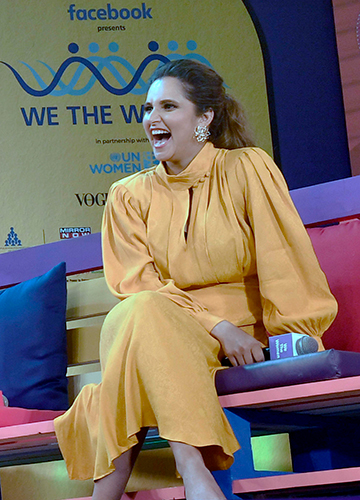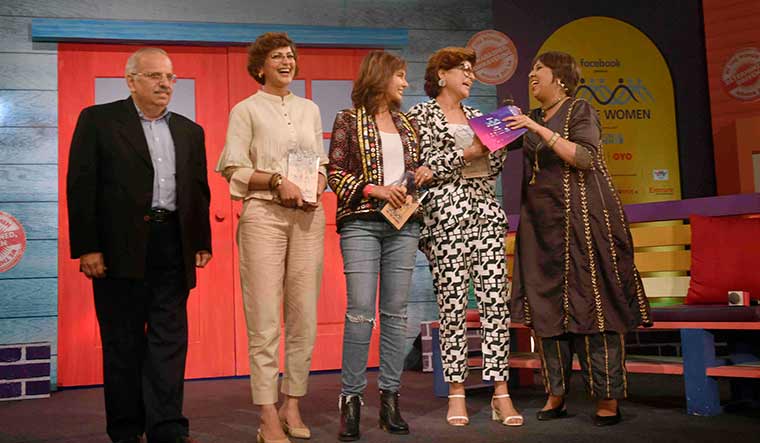The first Sunday of December was a day of many moods and emotions at We The Women—a one day conclave curated by journalist Barkha Dutt—at Mehboob Studio in suburban Mumbai. Inspiring women achievers from different walks of life came together to spark a range of conversations around patriarchy, sexism, gender inequality, prejudice, safety, dignity and women’s rights. The central theme of the summit, across all 25 sessions, was about challenging gender stereotypes and opening the metaphorical doors to freedom and choice for women living in the shadows of their own inhibitions or under the pressures of society at large.
A spirited Sania Mirza, who looked smart in a yellow skater dress, set the tone for the day when she questioned the notion that women cannot have it all. Sania, who took a break from tennis during the birth of her son, Izhaan, is looking at making a comeback early next year. But, her journey to this point, she admitted, has not been easy, given the sexism she had to battle along the way—first as an independent and ambitious career woman and later as a wife and a mother. “There were moments when people got personal, wondering why we did not have a child for eight years after marriage, completely ignoring the fact that as a couple we made some choices,” said Sania, “When I put on 23 kilos during pregnancy people whom I knew very well passed rude comments and questioned my ability to bounce back.”
Sania, publicly, took on some of the biggest male tennis players in the country, when different standards were applied to them on the court. She spoke about the public disagreement between Leander Paes and her many years ago. “For me it was about the fact that there is no equal treatment,” said Sania, “I had just won the French Open with Mahesh [Bhupathi] at that point, and was among the top ten players in the world and was being told what to do and what not to do by some men. The fact that you are questioned at every step, only because you are a woman, is unforgivable.”
Mirza’s voice found an echo in Nitu Bhattacharya, DIG, CRPF, and mother of a teenage daughter. She is one of the first lady officers to join the armed forces in the country. Bhattacharya currently leads from the front in Jammu and Kashmir at minus 20 degrees Celsius. In conversation with Shelley Thakral, head of policy programmes at Facebook, Bhattacharya spoke about the challenges she faced as a young inductee when the CRPF raised the first all-women’s armed battalion in the world, and later as a veteran policewoman commanding men in the line of duty. “Men taking orders from women still happens to be a notion far removed from our culture,” she said, “It was tough initially, but then men have no choice other than undergoing a lot of mental orientation to come to terms with it. Also, the onus is on the woman to prove herself worthy of respect. Yet, I believe that professional competence is gender neutral. If you have it in you, you shall rise no matter what your gender.”
A chilling conversation around women’s safety and dignity took centrestage after the shocking gangrape and murder of a veterinary surgeon in Hyderabad. Said Poonam, a close friend of the victim, ”If killing a rapist is a crime, I want to be that criminal. I’d rather see them dead than watch them get off scot-free.” Just when we thought that things had changed after the 2012 Nirbhaya rape case, statistics tell another story. While the number of reported cases of sexual harassment and abuse have gone up by 40 per cent, there has been a historic low in the number of convictions. Seven years on, Nirbhaya’s parents—Asha Devi and Badrinath Singh, who continue to fight for women’s safety and dignity—are still awaiting the day when their daughter’s rapists will be sent to the gallows. Making a remark on the short-lived discourse on the fight against rape, Asha Devi said, “People forget too soon. We cannot let this discussion die. We, the women, have to come together and ensure rapists are brought to book.”
As the sessions progressed, intriguing stories of courage, tenacity and resilience emerged from women from different realms of life who were fighting it out on a daily basis in a male-dominated society. While Priyanka Chaturvedi of the Shiv Sena, Shama Mohamed of the Congress and Shaina N.C. of the BJP debated if politics was still a man’s world, the third generation women from corporate India described how they had to go the extra mile to make themselves count.
Upasana Kamineni, vice chairperson, Apollo Foundation, Ashni Biyani, MD, Future Group and Priya Agarwal of Vedanta, hailed a woman’s ability to multi-task and be good at everything they put their fingers on. Priya juggles her passion for music with her day job in metals and mining with equal ease. As does Upasana, whose decision to join the family business was inspired by the strong women in her family who are active corporate leaders. Despite being a well-educated, qualified leader, she is asked questions which nobody will dare ask a man. “I still get asked why I do not have kids after seven years of marriage,” said Upasana, while speaking to Radhika Gupta, chief executive officer at Edelweiss Asset Management Limited, who moderated the session.
The pay-parity discourse showed up again in the session with Karan Johar who claimed “in Dharma Productions there are women who are paid much more than men”. Speaking about the ten things men must change about Bollywood, Johar said number one must be their “fake sense of women empowerment”. Alia Bhatt got emotional when she discussed her elder sister Shaheen’s book on battling depression. “Even though I have lived with her for 26 years I only understood what she was going through after reading her book,” Bhatt said. “I felt as if I did not put myself out there to understand what she was going through.”
Speaking on wellness, Rujuta Diwekar—whose recent provocative and contentious statement “even if you are a diabetic, eat a mango,” annoyed a number of doctors—said: “Coffee is not the problem, but using it to suppress one’s appetite is. There is no perfect body. It keeps changing all the time and the less attached you are to it the more focused you will be.”
Dr Boman Dhabar, renowned medical oncologist with Breach Candy Hospital, Mumbai, spoke about the need for early screening among women for cancers of different types. “There are a few cancers where it is shown that early screening is useful and breast cancer is one among them,” he said, “More important than that is cervical cancer. It is believed that if any woman is diagnosed with cervical cancer, we have failed in screening that lady. Because it is totally preventable if screened on time. Also, women should take care of themselves and not take their health for granted.”




